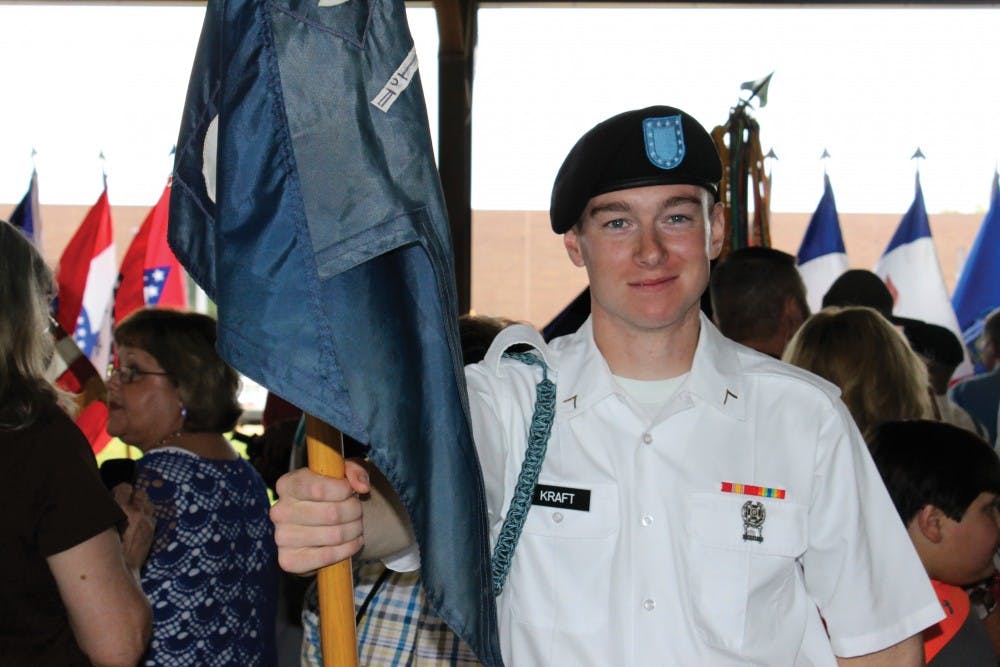Serving the nation at school

Balancing college courses with military service may seem impossible, but is not uncommon at Central Michigan University.
The university has a long-standing reputation for accommodating military students, and has been voted as one of the best military-friendly universities in the nation.
Canton sophomore Mike Giradot enlisted in the National Guard in October. He is taking Reserve Officers' Training Corps classes in addition to being in the Guard, making him a part of the Simultaneous Member Program. Being in the SMP allows students to attend college, gain experience from ROTC classes and serve in the U.S. Army Reserve or Army National Guard at the same time.
“(Students) take ROTC classes and do the events and training with ROTC. Then one weekend a month (students) drill with the National Guard unit,” Giradot said. “It’s a good balance.”
A big benefit for Giradot was the employment opportunities after college, he said.
“With ROTC, it sets you up to be an officer after you graduate and that’s great because it gives you a career or at least the potential for it,” Giradot said.
Director of CMU's Veteran’s Resource Center Steve Rellinger said unless a student is called to active duty, the responsibilities of being in the National Guard are mainly to drill one weekend a month.
“National Guard historically has been just that, to guard the nation,” Rellinger explained. “Only now in this war—this is the first time in the nation’s history— they’ve called up the active duty and sent (students) overseas.”
Suttons Bay sophomore Alex Kraft joined the National Guard the same time as Giradot, and also is in the simultaneous member program because he is taking ROTC classes.
Kraft joined the National Guard in October 2013. He said he felt it was a good way for him to give back to the country while maintaining a civilian life.
More than 60 percent of troops that have been sent overseas have been in the National Guard because it’s been an all-volunteer force, Rellinger said.
“The National Guard has really stepped up in this time of need and helped with the war,” Rellinger said. “It’s not their typical role. They’re supposed to guard the nation. It’s a different time—an unusual time in our history.”
As a new member of the National Guard, Kraft said the most difficult thing he has encountered was basic training.
“It was physically challenging, but it was really cut-off from the world,” Kraft explained. “It was (hard) being so far away from my home state and not knowing anything about the world outside of a 20 mile radius for three months.”
Basic training for Kraft took place in Georgia for three-and-a-half months. Right now Kraft participates in drills in Big Rapids for. After he graduates he has an eight-year commitment with the Guard.
“I’m in the National Guard doing drill every month for six years and then two years after that in case something happens and they need to call me up, they can do that rather than go into a draft, that’s how they avoid draft,” Kraft explained. “I’ll be inactive reserve—is what it’s called—eight years total.”
Kraft said that so far his training has been a lot of paperwork and learning how to identify threats, and how to be civil in a town halfway across the world.
“You join the army and it’s a group of kids like you,” Kraft said. “It was kind of surprising.”
Sergeant First Class and ROTC Liason Shawn Fries said the main motivator he sees in students wanting to join the military at CMU is to get financial help to pay for school. Even so, they still recruit for smart, high-quality character people.
“The misconception nowadays is everybody can join the military,” Fries said. “That’s not the reality. College campuses are such a vocal point of recruiting nowadays because this is our cream of the crop.”
Fries is a lifelong military man, and said he recognizes a difference with how important the military is to this generation, but he sees the financial benefits outweighing that.
“That’s what’s cool about National Guard and ROTC,” Giradot said. “They’re kind of like keyed in on helping people go to school and getting an education while being in the army. It caters to the time commitments you need and the financial burdens of college.”
The mindset of the Army, according to Sgt. Fries, has changed.
“The army during the wars was more focused on quantity, not quality,” Fries said. “Now the spectrum has shifted to quality over quantity. College kids are more ambitious, goal-oriented, and they’ve got better opportunities to be more successful here at school.”
These views do not reflect those of the U.S. Army.



